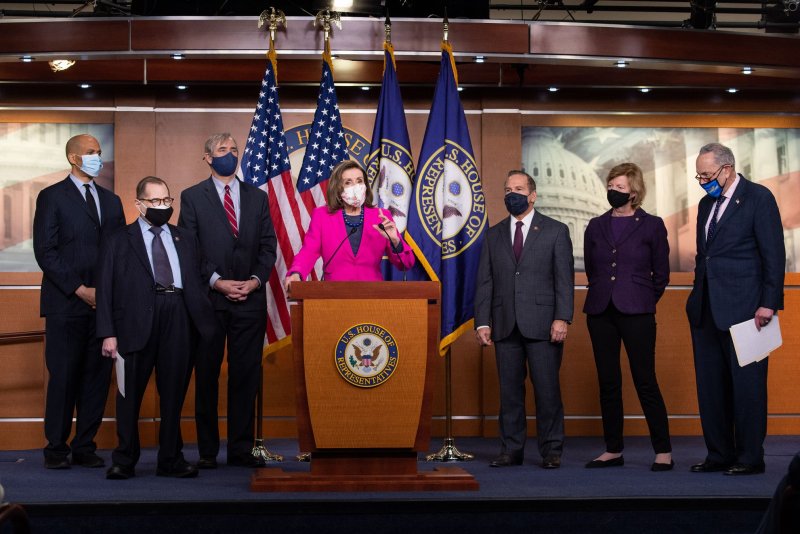House Speaker Nancy Pelosi speaks on Thursday alongside fellow Democrats, including Senate Democratic leader Charles Schumer, at a press conference at the U.S. Capitol complex in Washington, D.C. Photo by Kevin Dietsch/UPI |
License Photo
Feb. 26 (UPI) -- The House is expected to pass President Joe Biden's $1.9 trillion coronavirus stimulus package on Friday, hours after the Senate parliamentarian ruled that a $15-per-hour national minimum wage can't be included.
While House Speaker Nancy Pelosi said the minimum wage provision will remain in the House bill, the Senate ruling Thursday essentially ends the possibility that it will be included in the final version.
Biden has called the package the American Rescue Plan and several Democratic lawmakers have said the minimum wage hike is a key part of the bill.
Because Democrats have used a process called budget reconciliation to pass the legislation, there are limits for what can be included. On Thursday, Senate parliamentarian Elizabeth MacDonough ruled that the minimum wage provision doesn't meet the criteria for reconciliation and must be dropped from any final law.
"President Biden is disappointed in this outcome," White House press secretary Jen Psaki said in a statement late Thursday. "He respects the parliamentarian's decision and the Senate's process.
"He will work with leaders in Congress to determine the best path forward because no one in this country should work full time and live in poverty."
Budget reconciliation allowed Democrats to pass the bill in the Senate without any Republican support.
The wide-ranging bill does include a direct payment of $1,400 for most Americans, which would be the third stimulus payment in the past year, as well as enhanced federal unemployment payments of $400 per week, a $3,600-per-child allowance for one year and billions to distribute coronavirus vaccines and aid for schools and local governments.
The House bill allows for people making up to $75,000 and couples making up to $150,000 to receive the $1,400 payment. Individuals making up to $100,000 and couples up to $200,000 will receive gradually smaller payments.
The bill is Biden's first major legislation as president and the Senate parliamentarian's decision may make it easier to pass. Every Democrat in the Senate must vote for the final bill for it to pass.
Moderate Democrat Sens. Joe Manchin of West Virginia and Kyrsten Sinema of Arizona had opposed raising the federal minimum wage to $15 per hour. The current federal minimum wage is $7.25 per hour and hasn't changed in more than a decade.














